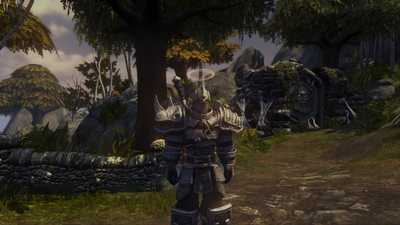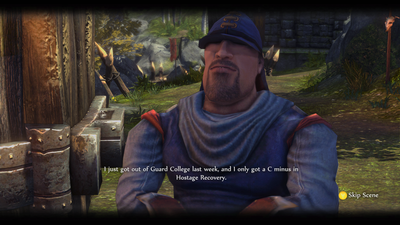Fable: Anniversary
When the original Fable was released in 2004, it made waves. As Guildford Games wrote in their eulogy for Lionhead Studios:
The touchstones for Fable were folklore, humour and a desire to offer the player an experience that didn’t demand too much from them, free of complexities… Microsoft’s involvement ensured focused marketing in America, but hardly any in the UK, leading it to gaining a substantial fanbase in America. The US audience were beguiled by the fairy tale nature of the game, they applauded the progressive ‘love is love’ message and welcomed Fable into their hearts.
Ten years and two celebrated sequels later, Fable: Anniversary was released in 2014, updating the Xbox-era graphics with the power of the Xbox 360 and bringing the content of Fable: The Lost Chapters into the fold. Nearly another decade after that (well, seven years later, at Xbox’s 2021 not-E3), Playground Games announced a new Fable, which is forever fated to be disambiguated as Fable (202x) by game writers everywhere. So here I am in 2022, having never touched a Fable game, thinking: “What an exciting time to cherish an old classic!”
Well folks, mistakes were made.

In all fairness, when I decided to play Fable: Anniversary, I was braindead-tired from a long day of research and stuck in a hotel room with very poor Wi-Fi and a modest TV screen that was inexplicably tilted slightly upwards towards the ceiling. This was not the vibe for continuing on in the masterwork that is Mass Effect: Legendary Edition, nor for running duos with my wife in Fortnite only to lag out once every five minutes. No, this slumpy, tired-tech vibe was for an eight year-old remaster of an eighteen year-old classic with a single-player narrative and last-last-generation graphics. And that’s exactly what Fable: Anniversary shaped up to be.
I could go on for too long about what didn’t age well: clumsy combat mechanics, early difficulty spikes followed by an obscenely long difficulty plateau, poor inventory management, romance with NPCs lacking any personality, “powerful” female characters with no agency whatsoever… there’s a lot to suffer through, especially from a modern perspective.
That being said, I think Fable is delightfully nostalgic in two ways: not taking itself too seriously, and applying that same explorative approach to role-playing moral dichotomies. While the occasional joke is Fable is almost too dumb, the vast majority are good-natured and enjoyable. Just as I was getting annoyed with Fable’s excruciatingly long tutorial, the first side quest outside the Hero’s Guild was a triple fetch quest to get a series of haircuts that made me look increasingly stupid—as the mockery of all passerby NPCs confirmed—in order to impress a girl. Turns out the girl didn’t exist, but her “father” greatly enjoyed making me look like an idiot. And that’s exactly what I was in that instance: fresh out of guild training, ready to take on all of Albion, and already spending all the money I had on haircuts to meet a girl. Good joke!

Unlike 2007’s Mass Effect which treats choices between good and evil with the narrative and relational seriousness that earned that series its glowing reputation, Fable takes a much more whimsical route. Flirt with another person in front of your adoring spouse? That’s not even a morally consequential issue. Eat a crunchy chick or sacrifice a human being to Skorm? Those are roughly equally bad. Go on an indiscriminate murdering spree of innocent traders and bloodthirsty bandits? It’ll all balance out. Donate a crappy old axe to charity to outweigh all your sins? Sure, why not! As with everything else in Fable, morality is inconsequential—which is not to say it isn’t meaningful, but rather that it’s a buffet of experiences to be enjoyed.
Hidden in that treatment of morality is a much appreciated bit of gaming wisdom, one that has fallen out of vogue with modern RPGs (thanks, Bethesda) and one that made playing through this aging classic well worth it: Good games can be silly. Good games can be simple. Good games can be fun.